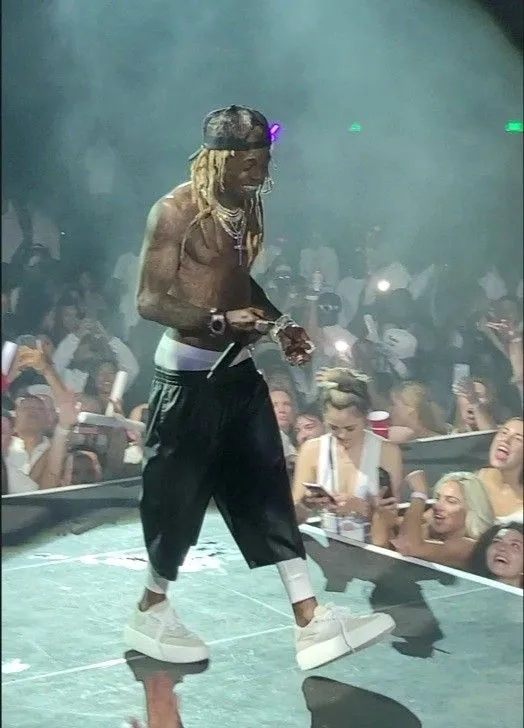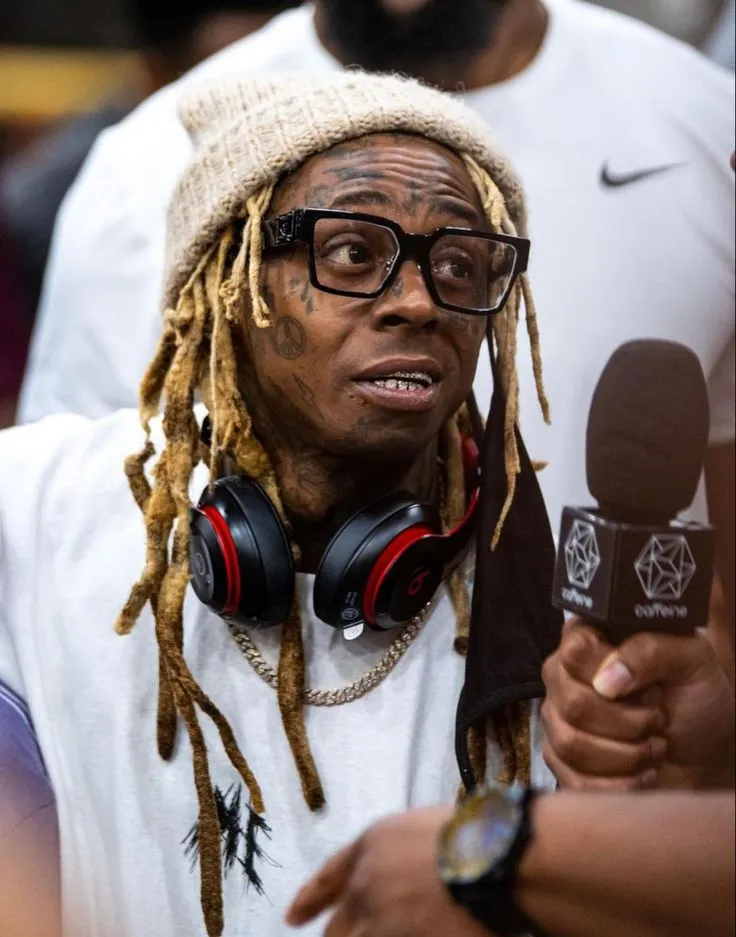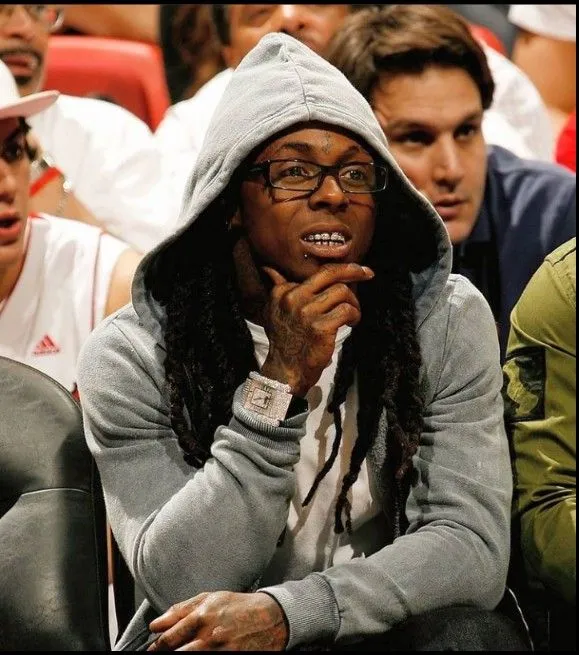

Lil Wayne Gets the Key to the City and the First Walk of Fame Spot – But NOLA Residents Explode with Controversy: ‘Does He Really Deserve It?’
New Orleans has seen parades, Mardi Gras, Super Bowl victories, and countless music festivals, but nothing prepared the city for what happened when Lil Wayne stepped on stage at his annual Lil Weezyana Fest. The local boy who once called Hollygrove home, the rapper who defined a generation with Tha Carter series, was suddenly crowned with three unprecedented honors in a single evening: the Key to the City directly from Mayor LaToya Cantrell, two official “Lil Wayne Days”, and the history-making title as the first-ever artist immortalized on the New Orleans Walk of Fame. Fans cheered, fireworks lit up the night sky, and social media exploded. But while the city celebrated, a bigger question lingered: Is this a well-deserved recognition of a hometown hero—or a political move wrapped in golden fleur-de-lis?
The Key to the City – Why It Matters
The symbolic Key to the City of New Orleans isn’t just another shiny trophy in Lil Wayne’s collection. It’s a historic gesture, rarely handed out, and usually reserved for those who have made extraordinary contributions to the culture and spirit of the city. Mayor Cantrell personally presented the honor, calling Wayne not only an artist but also a cultural ambassador who has carried New Orleans to the world stage. For many residents, this moment felt overdue.
 Lil Wayne, after all, has sold over 120 million records worldwide, mentored superstars like Drake and Nicki Minaj, and placed New Orleans on the global hip-hop map. But for critics, the timing was just too convenient—arriving right in the middle of one of the city’s most high-profile festivals, where the mayor’s office could bask in the reflected spotlight.
Lil Wayne, after all, has sold over 120 million records worldwide, mentored superstars like Drake and Nicki Minaj, and placed New Orleans on the global hip-hop map. But for critics, the timing was just too convenient—arriving right in the middle of one of the city’s most high-profile festivals, where the mayor’s office could bask in the reflected spotlight.
Lil Wayne Day – Not One, but Two Dates
As if one celebration wasn’t enough, the city announced that not one but two official days would forever be named “Lil Wayne Day.” September 2nd and October 29th now belong to Weezy in New Orleans history. The first marks the early years of his rise, the second his breakthrough as a solo artist and label founder. Supporters see it as a recognition of Wayne’s longevity—he isn’t just a rapper; he’s a multi-decade phenomenon whose music has shaped pop culture for more than 20 years. Detractors, however, immediately began to ask the uncomfortable question: why does Wayne get two days when legends of jazz like Louis Armstrong, Fats Domino, or Allen Toussaint have never been honored in the same way? That tension between modern hip-hop dominance and the deep roots of New Orleans’ jazz and blues legacy has now become the core of the city’s heated debate.
The Walk of Fame – Wayne First, But Who’s Next?
The third honor was perhaps the most controversial. Lil Wayne became the very first artist to be immortalized on the New Orleans Walk of Fame, his name engraved on a shining fleur-de-lis set in the iconic Canal Street pavement. The Walk of Fame project, designed to honor cultural icons who represent the city globally, launched with Wayne as its debut honoree. Fans rushed to take photos, and Canal Street quickly became a tourist hotspot. But here’s the catch: why Wayne first? Some say it’s fitting, considering his massive global impact and his role as “New Orleans’ Rap God.” Others argue it’s an insult to the pioneers who built the city’s music heritage brick by brick. On talk radio, in barbershops, and across Twitter, the question burned: Was this the right choice, or was it pure political theater meant to win applause during festival season?
From Hollygrove to History – The Rapper’s Journey
It’s easy to forget that before the fame, the accolades, and the millions, Lil Wayne was Dwayne Michael Carter Jr., a kid from Hollygrove, one of New Orleans’ toughest neighborhoods. He joined Cash Money Records at just 12 years old, became part of the Hot Boys at 15, and by his early 20s, was already a platinum-selling star. His “Tha Carter” albums transformed him into a household name and cemented his lyrical genius. Wayne’s story is the quintessential New Orleans tale—born in poverty, raised in struggle, but rising above it all with pure talent, relentless work ethic, and undeniable swagger. To many, this latest round of honors isn’t just about music. It’s about a local boy who made it big but never stopped carrying the name of his city with him.
Fans Celebrate, Critics Debate
The reactions split the city in two. On one side, thousands of fans see this as justice for an artist who put NOLA on the global rap map, someone who deserved recognition long before now. On the other, critics point to Wayne’s past controversies: his brushes with the law, his outspoken political statements, his sometimes complicated relationship with his hometown. Local musicians quietly questioned whether this was more about politics than culture, with the mayor’s office eager to tie itself to a high-profile figure at the perfect PR moment. Yet, as fireworks roared over the Mississippi River that night, it was clear the public wasn’t thinking about politics—they were celebrating the man they call Weezy F. Baby.

Social Media Storm – The Internet Reacts
As soon as the announcement hit, hashtags like #LilWayneDay, #KeyToTheCity, and #NOLAWalkofFame trended on Twitter and Instagram. Fans posted videos crying with joy, others shared clips of Wayne performing “A Milli” and “Lollipop” at Weezyana Fest, declaring it “the proudest moment in NOLA history.” But just as quickly, the trolls came out. Some mocked the decision, saying Wayne’s recent musical output doesn’t compare to his early years. Others questioned the double recognition when countless other artists still wait for acknowledgment. The mix of love and hate only fueled the fire, making the story go viral across entertainment outlets, blogs, and even political columns.
Political Undertones – A Strategic Move?
Behind the celebrations lurks a more complicated reality. New Orleans, like many U.S. cities, faces tough questions about leadership, crime, and community rebuilding. By honoring Lil Wayne in such a grand and historic fashion, the mayor’s office has essentially tied itself to the rapper’s image.
For supporters, this is a smart move—aligning the city’s leadership with a world-famous figure beloved by the younger generation. For opponents, it’s a distraction tactic designed to generate headlines while the city struggles with deeper problems. Either way, the impact is undeniable: Lil Wayne’s name is now etched into the civic identity of New Orleans in ways no one can ignore.
What This Means for Lil Wayne’s Legacy
For Lil Wayne, this triple honor cements his status not just as a superstar rapper but as a cultural icon whose influence extends far beyond music.

He is now officially part of New Orleans history, forever linked to the city’s image and identity. The question now is how he will carry that weight. Will he use his platform to uplift the city even more, investing in education, community programs, or youth initiatives? Or will this recognition be remembered mainly as a symbolic gesture, frozen in the glow of festival lights?
Conclusion – Hero, Symbol, or Political Pawn?
The story of Lil Wayne receiving the Key to New Orleans, having two days named in his honor, and becoming the first artist on the Walk of Fame isn’t just about one man’s triumph. It’s about how a city chooses to recognize its heroes, how politics and culture collide, and how the definition of “legacy” keeps evolving in real time. Whether you see it as overdue recognition, political theater, or a little of both, one thing is undeniable: New Orleans will never forget the night Lil Wayne became more than just a rapper—he became a symbol of the city itself.


















